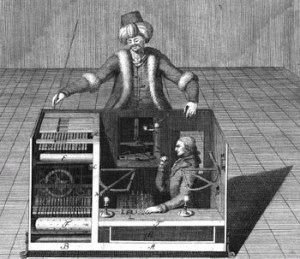
The 'Mechanical Turk' provides the illusion of technological advance, but humans are still doing the work.
(Image by mandiberg) Details DMCA
Data gathering and crunching by glorified cab company Uber has been back in the news lately in a big way, and not in a good way. A senior executive at Uber notoriously suggested that Uber use this data to conduct "oppo research" on journalists who are critical of the company; in the midst of the ensuing hullaballoo, revelations emerged that Uber management had misused such data on multiple occasions, spooking at least one journalist with a comment that "I was tracking you," on Uber's "God View" screen.
One question has been little raised in the controversy since: exactly what use is the data analytics that Uber engages in? I mean, besides intimidating reporters and creating ethically questionable blog posts about the one night stands of passengers?
The answer, according to Uber, is that this data manipulation is central to Uber's ability to deliver cars to passengers quickly and reliably. Impressive algorithms, real-time tracking, and "Big Data" analytics are what makes Uber different from all those other, old-fashioned taxi dispatching services. This, claims Uber, is what makes them key to the future of urban logistics, and justifies their insane-sounding valuation of up to $30 billion.
The problem? It's just not true. The data tricks, in truth, do little or nothing.
Uber is really nothing more than a mechanical Turk.
The original "mechanical Turk" was an 18th Century scam of Uber-esque proportions -- a mechanical figure, dressed as a "Turk," sitting at a table and playing chess against live opponents. The public was amazed as this apparent automaton won game after game. How was it possible? What miracle of modern technology was this?
The secret, however, was that there was no miracle. Instead, a chess master hid inside the cabinet, operating the controls of the "automaton." This was not advanced technology, only the illusion.
You may have heard of Amazon's "Mechanical Turk," the crowdsourcing website that calls itself "a marketplace for work that requires human intelligence." Amazon's Mechanical Turk farms out tiny increments of work, tedious to humans but too complex for computers, which are largely taken on by a desperate, third world workforce willing to work for pennies at a time.
(Note: You can view every article as one long page if you sign up as an Advocate Member, or higher).




